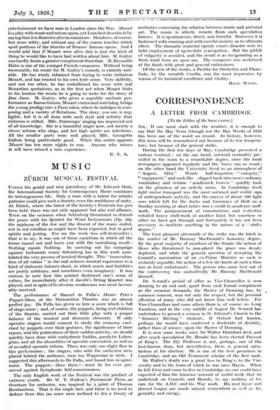MUSIC
ZURICH MUSICAL FESTIVAL
UNDER the genial and wise presidency of Mr. Edward Dent, the International Society for Contemporary Music continues its heterogeneous life. Only a man with a talent for infinite patience could give such a Society even the semblance of unity. At. Zurich, where the latest of the Society's Festivals has just been held, there was not only apparent but also real alliance. Even on the occasion when Schonberg threatened to disturb the peace with his Quintet for Wind Instruments (Op. 26), the applause of the few and the dissent of the many ended, not in red rebellion as might have been expected, but in good spirits and jesting. For me the work was self-destructive ; that is to say, it was one of those equations in which all the terms cancel out and leave you with the tantalizing result : Nothing equals Nothing. In carrying out his campaign against hedonistic music Schonberg has in this work anni- hilated the very process of musical thought. This " transvalua- tion of all values" in the end reduces musical expression to a kind of elaborate balance-sheet, in which assets and liabilities are purely arbitrary, and sometimes even imaginary. It was curious to note how this quintet destroyed one's sense of values, for immediately after it Jacobi's String Quartet was played, and in spite of its obvious weaknesses was most favour- ably received.
The performance of Manuel de Falla's Master Peter's • Puppet-Show, at the Marionetten Theatre, was an almost perfect joy. De Falla has given us here a score which is full of stage-sense ; and, of course, the puppets, being real children of the theatre, carried out their little play with a proper balance of the musical and dramatic elements. If only operatic singers would consent to study the economy exer- cised by puppets over their gestures, the significance of their repose, and the pointedness of their sudden activity, we should quickly have done with eurhythmic Isoldas, paralytic Lohen- grins, and all the absurdities of operatic convention, as well as of so-called operatic reform. There was only one slight flaw in this peel's)rmance ; the singers, who with the orchestra were placed behind the audience, were too Wagnerian in style. I suggested this afterwards to De Falla, and found him in agree- ment. The puppets—bless them !—must be for ever pre- served against Symphonic Self-consciousness.
The only English work of the Festival was the product of extreme youth. Mr. W. T. Walton's Portsmouth Point, an Overture for orchestra, was inspired by a print of Thomas Rowlandson. That is the single fact, and there is no need to deduce from this (as some were inclined to do) a theory of
aesthetics concerning the relation between music and pictorial art. The music is utterly remote from such speculative fancies. It is spontaneous, direct, and forceful. Moreover it is fashioned with cunning and with careful anxiety as to ultimate effect. The thematic material openly courts disaster with its bold employment of up-to-date syncopation. But the pitfall of vulgarity is avoided, and the result is as invigorating as a fresh wind from an open sea. The composer was acclaimed at the finish with great and general enthusiasm.
Of the rest of the works, a Partita for Orchestra and Piano- forte, by the versatile Casella, was the most impressive by reason of its technical excellence and vitality.
BASIL MAINE.










































 Previous page
Previous page